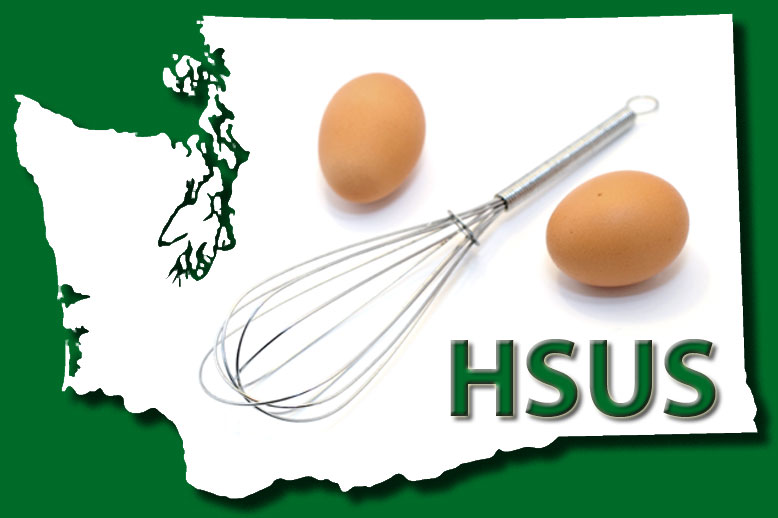Peck-Peck-Pecking Away at Washington Egg Farmers
It’s been a little over two years since the Humane Society of the United States and its activist ally Farm Sanctuary convinced a majority of California voters to deliver a crippling electoral blow to the state's farmers. This year the animal rights groups are targeting the state of Washington with the same outcome in mind: an eggless America.
Animal rights lobbyists from the other Washington—Washington, DC—are managing a campaign committee called “Washingtonians for Humane Farms,” and if you live in the Evergreen State they might be canvassing your neighborhood already. Their short-term goal is to secure at least 241,000 signatures so their “important measure” will appear on the November ballot.

If Washington voters were to approve it, this measure would make it illegal for Washington farmers to raise egg-laying hens in cages. Additionally, regular eggs would be banned from grocery stores. (Unlike in California’s “Proposition 2,” there’s no ambiguity about whether farmers can use “enriched” cages of the type that Temple Grandin and the American Humane Association endorse. They would also be banned.)
Signature-gathering animal rights activists will likely tell voters that the only way to ensure hens lead happy and healthy lives is to force every farmer to go cage-free. Science, however, is anything but clear on the topic.
HSUS's minions may ultimately be doing more harm than good. And yes, they are HSUS's minions: With records current through February 10, Washington's Public Disclosure Commission reports [ 1 | 2 ] that HSUS is the only cash contributor to the campaign so far—putting $150,000 of its donors' money into the campaign in January.
Here are three animal-welfare reasons why voters should squawk when HSUS’s wing-flappers solicit their support to criminalize the sale of "regular" eggs:
- Hen mortality rate: Dr. Joy Mench, a leading Animal Science professor at UC-Davis, tells the Sacramento Bee that cage-free hens die at more than twice the rate of caged hens, likely the result of increased exposure to one another (and to their own manure).
- Broken bones: Dr. Mench adds that cage-free hens, left to jump around the barn, suffer high rates of broken bones, as high as 67 percent in one study.
- Stress: Scientists at Australia’s Sydney University found that free-range and “open-barn” chickens experience just as much stress as caged birds, since they have to deal with extra pressures like extreme temperatures, parasites, and predators.
Why would anyone interested in the welfare of chickens want to recommend a wholesale switch to a system that will end up making conditions worse for more of them? It’s a mystery.
But more than 40 animal rights and environmental groups have already endorsed HSUS’s ballot measure. Not surprisingly, a large majority of them are from out of state, and few have any practical experience working with poultry.
Here are a few of the more notable ones:
- Farm Sanctuary: HSUS’s campaign ally in California has a history of pushing for farm animals’ legal “rights” in Florida, California, New York, New Jersey, and Arizona. After successfully adding pregnant pigs to Florida’s Constitution in 2002, Farm Sanctuary paid a $50,000 fine for violating Florida election law at least 210 times. HSUS has funneled more than $111,000 to Farm Sanctuary—money that supports its manipulation of donors and voters alike.
- Physicians Committee for Responsible Medicine (PCRM): Although this group’s name may sound mainstream and lab-coated, PCRM got its start as an affiliate of PETA and its founding leader was also president of the PETA Foundation for several years. PCRM’s principle goal is to make Americans leery about eating meat, milk, seafood, and (you guessed it) eggs. The doctors’ paraphernalia is largely just window-dressing, however, since the vast majority of PCRM’s members never went to medical school.
- United Poultry Concerns: Best known for the antics of its wacky leader whose pet chickens roam her Virginia home, this group has engaged in letter writing campaigns, grocery-store protests, and Thanksgiving-day vigils for dead turkeys. UPC’s affinity for fowl is so strong that it even protests rubber-chicken manufacturers. We're not kidding.
- Albert Schweitzer Foundation: Not to be confused with the public-service charity bearing the great humanitarian’s name, this German organization exists to “strengthen the ideas of vegetarianism and veganism.” It has a zero-tolerance policy towards “commercial animal husbandry.”
- Center for Science in the Public Interest: CSPI fancies itself a “watchdog” group but behaves more like an attack dog, savaging restaurants, disparaging adults’ food choices, and (now) branching out to harass egg farmers. If you take a moment to imagine your favorite food, chances are CSPI has attacked it.
All but the last of these groups are abolitionist in nature. They’re less interested in cage-free eggs than in liberating chickens from their farm-bound existences. So their endorsements only make sense within the context of HSUS seeing “cage-free” campaigns as a stepping stone to eliminating egg farming entirely.
Washington-based animal rights activists understand this intuitively, which is why they’re all endorsing HSUS’s measure. Here are a few of the most notable ones:
- Northwest Animal Rights Network (NARN): This Seattle-based group allies itself with PETA and doesn’t mind tangling with police whether the cause is right or wrong. Its campaigns have, among other things, argued that eating meat is akin to cheering on the Nazi Holocaust.
- League of Humane Voters of Washington State: This political advocacy group is dedicated to making “animal protection a mainstream political issue,” but direct experience with farm animals isn’t part of its portfolio.
- Animal People News: This Clinton, WA newspaper is the “house organ” of the animal rights movement, and regularly runs full-page commercial (paid) display ads from HSUS.
The endorsement list will undoubtedly grow, of course, as HSUS’s canvassers persuade restaurateurs and other businesses to lend their names to the cause. We’re left to wonder, though, if these endorsers will get the benefit of the whole story before signing on. Somehow we doubt it.



